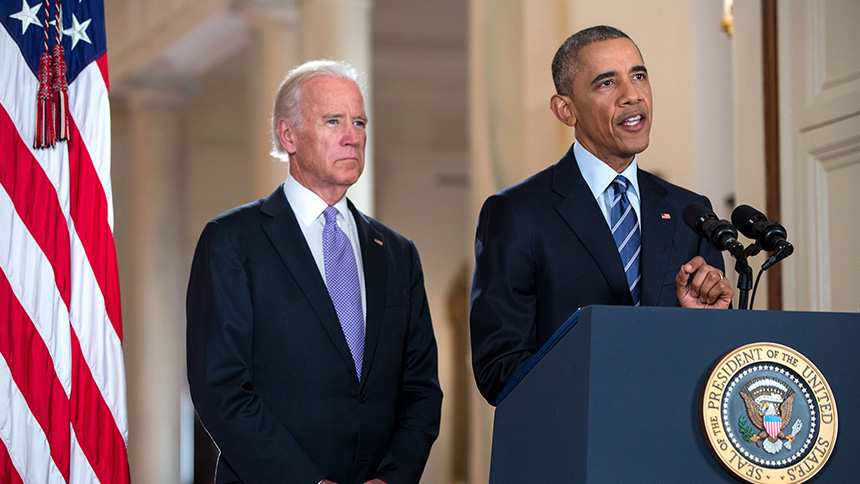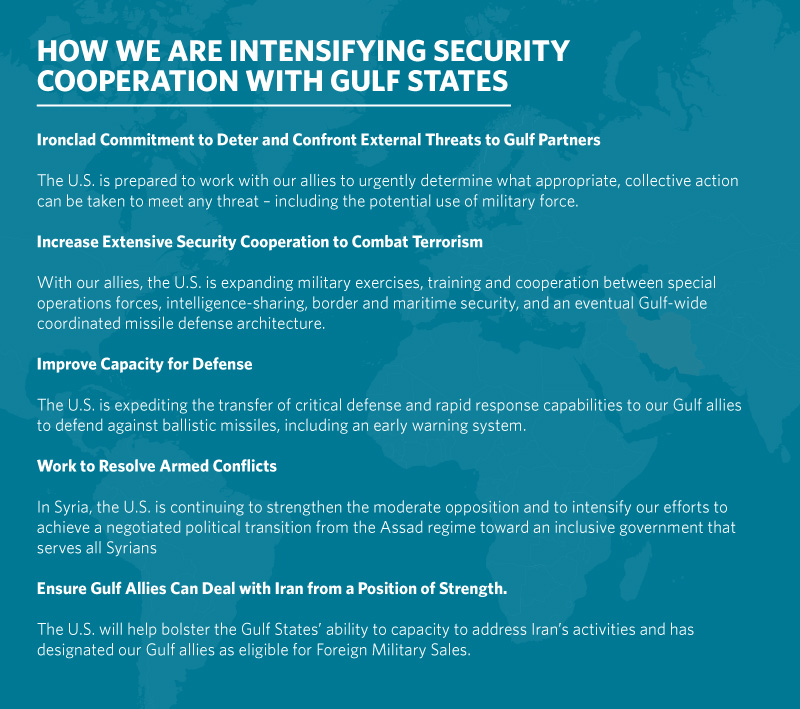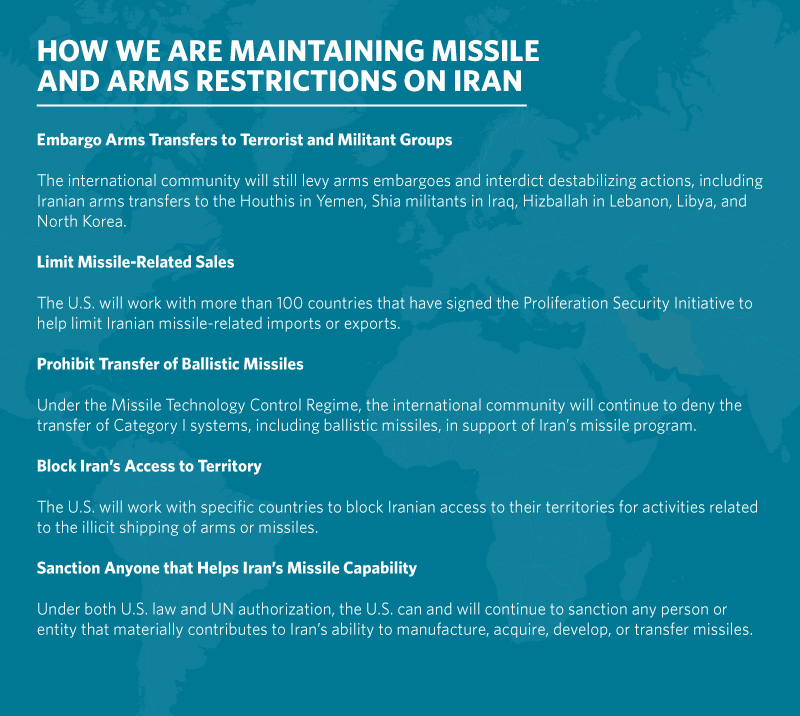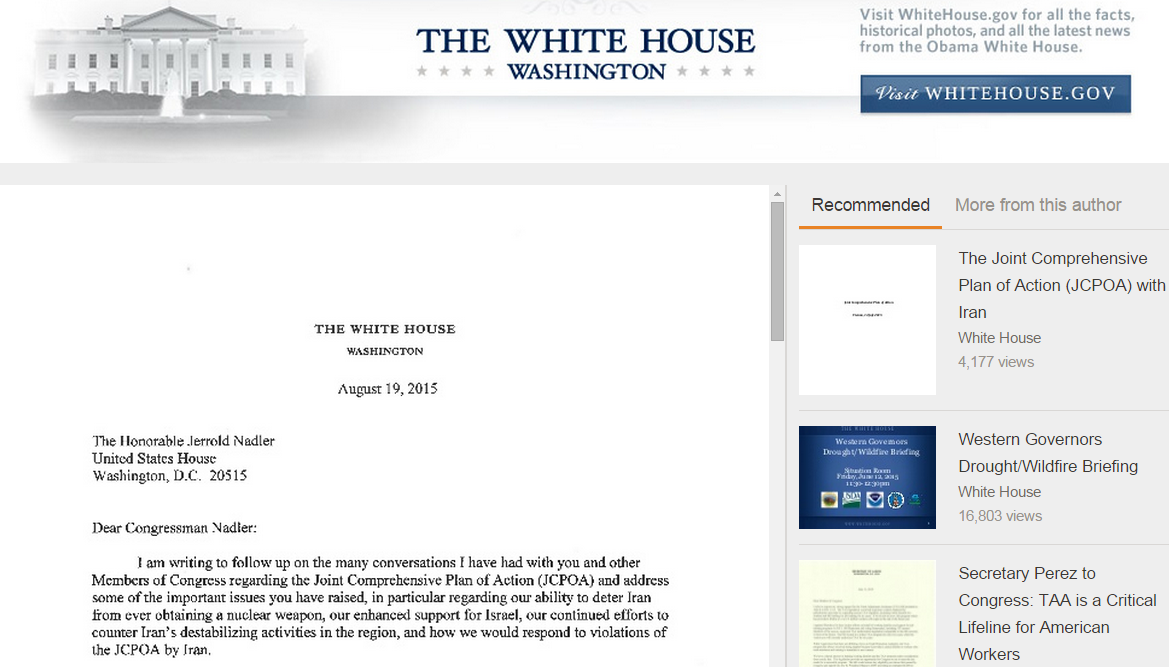
Throughout our negotiations with Iran, we were clear-eyed about Iran’s efforts to destabilize the Middle East, and we resolved not to let the regime off the hook. In fact, from sponsoring terrorist activity to human rights abuses, Iran continues to pursue destabilizing activities in the Middle East region that the U.S. and our allies continue to monitor and address.
So why did the U.S. spend nearly two years negotiating a nuclear agreement with Iran?
It’s a fair question with an important answer: As destabilizing as Iran’s regional activities are, they would be exponentially more dangerous with a nuclear weapon. And now that we’ve taken a nuclear-armed Iran off the table, we can ratchet up the pressure on its destabilizing activities—including its support for terrorism.
We are committed to countering Iran’s actions that threaten our national security interests and those of our allies, especially Israel. Here's how:
Strengthening the Defense and Security of Israel:
The United States and Israel have forged a deep and enduring bond since the United States became the first country to recognize Israel in 1948. The close engagement—at all levels—between the two countries reflects how our histories, interests, and values are so deeply intertwined between our two peoples. President Obama knows that Israel’s national security is paramount and that is why, under his leadership, the United States has provided an unprecedented level of support to Israel since he took office.
Under President Obama, we are helping Israel address new and complex security threats to ensure Israel maintains its Qualitative Military Edge (QME), or its ability to counter and defeat any credible conventional military threat through superior military capability and means. Here’s what that looks like:

Intensifying Security Cooperation with Gulf States:
For the past 70 years, the United States has maintained a core national security interest in the security and the stability of our allies in the Gulf region – Saudi Arabia, the United Arab Emirates, Kuwait, Oman, Qatar, and Bahrain. We’ve long cooperated on confronting the extraordinary challenges posed by ISIL, al Qaeda, the Assad regime’s war in Syria, and Iran’s destabilizing activities in the region.
As President Obama has said, we will continue to maintain a strong force posture in the region to deter aggression; bolster the security of our regional friends and allies; ensure the freedom of navigation of international waterways and the free flow of energy to world markets; and address nefarious actors that seek to sow the seeds of instability. Here’s what that looks like:

Maintaining Restrictions on Iranian Missile and Arms Activity:
Under the Iran deal, Iran will receive relief from nuclear-related sanctions only after it has implemented key measures to roll back its nuclear program and enhance transparency. However, the Iran deal also includes additional arms and missile restrictions for a significant period of time: five years for the arms embargo and eight years for missile restrictions. What’s more, the United States and international community will maintain a broad set of multilateral and unilateral tools, including sanctions, to continue to restrict Iranian conventional arms and missile-related activity. Here’s what that looks like:

The Bottom Line:
The nuclear deal is an element of our broader efforts to confront and counter Iran’s destabilizing activities in the region. The United States has long worked with its allies and partners to address Iran’s support for terrorism and regional militancy—and the Iran deal does nothing to weaken our resolve to continue to push back and defend our interests and friends. By neutralizing the threat of a nuclear-armed Iran, we are better positioned than ever to work with Israel and other partners to promote regional stability and advance our mutual security.
In a letter to Congressman Jerrold Nadler, President Obama laid out exactly what our efforts to counter Iran would look like and how they are strengthened by the implementation of the Iran deal.
As I have underscored repeatedly, it is imperative that, even as we effectively cut off Iran's pathways to a nuclear weapon through implementation of the JCPOA, we take steps to ensure we and our allies and partners are more capable than ever to deal with Iran's destabilizing activities and support for terrorism.President Obama
Read his entire letter here:
Colin Kahl is the Deputy Assistant to the President and National Security Advisor to the Vice President.

